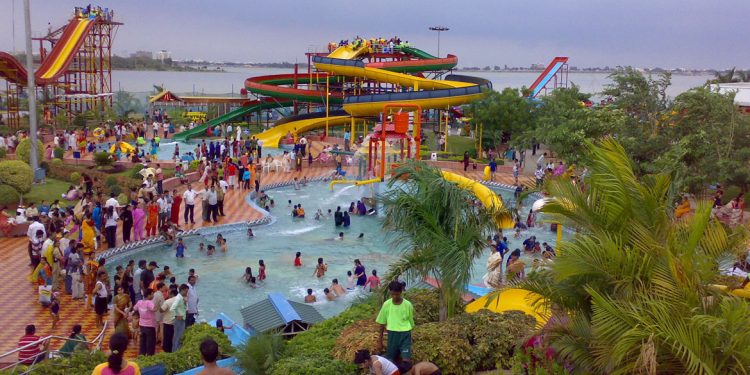Mumbai: At the height of the ongoing summer season, millions of young and old people throng big and small amusement parks in the country for fun, entertainment and enjoyment around the country.
But in the current lockdown, like most other sectors, the amusement industry, which is all about ‘family bonding’ – is ironically, marred by the norms of ‘social distancing’ mandated by the COVID-19 pandemic.
With a business of over Rs 2,700 crore per annum, India’s amusement industry faces the prospects of a downslide to estimated losses of Rs 1,100 crore, top players apprehend.
“Our peak season is March to June. The past few months from October-February were almost washed out in view of various extraneous factors. With amusement parks shut from March 15 onwards, the future post-lockdown appears bleak,” Indian Association of Amusement Parks & Industries (IAAPI) Chairman Ajay Sarin told IANS.
IAAPI, the apex body of all major open-air fun parks in the country has 150 members, plus around 65 dozen indoor amusement centres (in malls) and around 100 manufacturers of rides and games.
Besides, there are another 100-odd in the unorganized sector including small parks in holiday resorts, said Sarin who owns the Fun N Food Kingdom Dehradun and is a manufacturer through Hindustan Amusement Rides Pvt Ltd, Noida.
IAAPI Vice-Chairman Rajeev Jalnapurkar – who is CEO of Ramoji Film City in Hyderabad – said the industry employs over 80,000 people directly, hires more than 5,000 people seasonally, indirectly supports various other industries, besides lakhs of other including local communities.
“We have made huge investments, possess big infrastructure and provide large employmenta But, we have been denied industry status. Even after the lockdown is lifted, there is no clarity from the government on how it will ensure our survival and revival,” Jalnapurkar told IANS.
Maharashtra’s Adlabs Imagica Joint CEO Dhimant Bakshi said that amusement parks rake in over two-third of their annual revenue in mainly one summer season, which helps them pull through the remaining months.
“Due to lockdown, our main season is ruined. After lockdown is lifted there’s no guarantee that the crowds will return in view of the current scenario with pay cuts, lay-offs, etc. My personal estimate is that it will take at least 3-4 years for this industry to normalise,” Bakshi told IANS.
From the current Rs 2,700-crore, the industry was expected to grow upto Rs 7,500-crore, but the Coronavirus has put a question on its viability and survival now, leading players rued.
The trio of Sarin, Jalnapurkar and Bakshi worry that even after lockdown, they would be burdened with several fixed costs, wages, taxes and other charges, but without income from the amusement parks, the challenge is how to honour these commitments.
The IAAPI has urged the government to give a complete GST (18 per cent) holiday for one year, defer by six months Fiscal Statutory Compliance deadlines for direct-indirect taxes, advance taxes, provident fund, ESIC at the centre and state government levels.
The other demands include waiver of customs duties on import of spare parts, slashing the effective rate of interest on loans from financial institutions by 200 basis points, working capital facilities and other measures to improve the cash flow
The IAAPI has sought 12 months’ moratorium on instalments of principal and interest payments on loans and working capital besides doubling of working capital limits on interest-free and collateral-free terms, support fund for one year similar to MNREGA to help pay basic salaries with direct transfers to affected amusement industry employees.
It has demanded concessional pricing for water-electricity, lower rate of income tax and early settlement of IT refunds, ESIC to pay the entire wages of employees covered under ESI for the lockdown period, etc.
Sarin said as per the advisory of Ministry of Labour and Employment Secretary Heeralal Samariya, the IAAPI has asked all members not to sack employees and pay them wages/salaries without any deductions for March and the entire lockdown period.
Jalnapurkar said the amusement industry is a backbone of social infrastructure, plays a vital role in nation-building by offering active outdoor recreation for kids, youth and families.
“After lockdown is lifted, we could be further hit since families may avoid crowded places, travel restrictions may continue, hitting the tourist segment of our business,” Bakshi added.
Sarin urged that now the industry is on the verge of collapse with one revenue year virtually lost, and the government must come forward to rescue it from the prevailing financial turbulence to ensure its survival.
Amusement parks are further classified as: Theme Parks, Water Parks, Adventure Parks, Snow Parks, Aquariums, Private Museum, Virtual Reality & Games, Trampoline Park, Mirror Maze, Musical Fountains, etc., and are a huge draw from Diwali to June in east, west and south India, but due to the winter chill, operate only in summer in north-India.
IANS






































